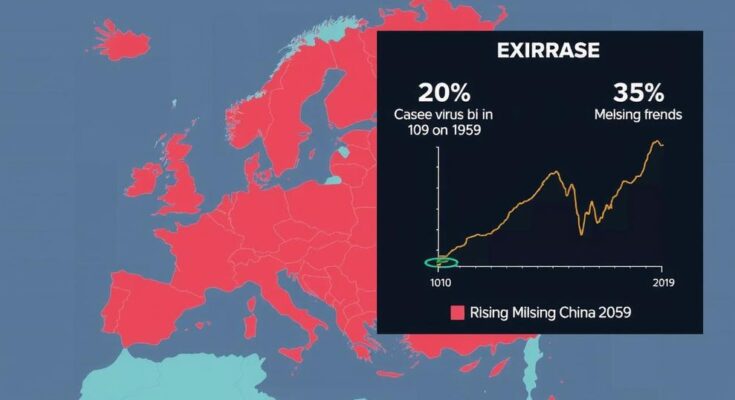The EU is monitoring a rise in human metapneumovirus (HMPV) cases in China, especially among children, while emphasizing that the situation is typical for winter. Influenza cases remain more prevalent. Countries including Indonesia and Malaysia have begun health monitoring from flights originating in China. Experts recommend caution and hygiene measures to reduce transmission as awareness of HMPV grows.
The European Union (EU) is currently monitoring cases of human metapneumovirus (HMPV) as infections surge across northern provinces in China this winter. The European Centre for Disease Prevention and Control (ECDC) has indicated that the rise in cases is typical for this period, reinforcing their commitment to ongoing surveillance in partnership with the Chinese Centre for Disease Control and Prevention and the World Health Organization. Reports highlight a concerning increase, particularly among children, although seasonal influenza remains the predominant respiratory illness in Chinese hospitals this winter.
In response to the outbreak, several countries including Indonesia and Malaysia have commenced monitoring measures for incoming flights from China. Travelers to Bali are now required to submit health information to local authorities prior to arrival. Singapore acknowledges a recent spike in HMPV cases attributed to increased social interactions during holiday festivities, though these align with expected seasonal patterns.
Chinese health officials report that HMPV infections have indeed heightened, specifically among youth under the age of 14, particularly in northern regions. Kan Biao, a representative from China’s CDC, pointed out that the collective respiratory infection figures are expected to remain lower than the previous year’s counts despite the current trends.
Despite the reported increase, the ECDC does not perceive the situation as alarming for the EU or European Economic Area. Dr. Conall Watson from the UK Health Security Agency has advised individuals with HMPV symptoms to limit contact with others and take precautions like wearing masks. He emphasized that HMPV typically causes mild symptoms similar to a common cold and that proper hygiene and caution during respiratory virus seasons could mitigate transmission risk.
Experts express concerns primarily for vulnerable populations, such as the elderly and young children, who may face severe illness from HMPV. Although the virus was first identified in 2001, it remains notable due to a lack of available vaccines or antiviral treatments. Current health communications underscore the public’s awareness regarding HMPV, influenced by enhanced detection capabilities and heightened attention towards respiratory infections following the COVID-19 pandemic.
Human metapneumovirus (HMPV) is a respiratory pathogen identified in 2001. It often resembles symptoms of the flu or common cold and typically sees increased activity during winter months. The recent spike in cases across China and various reactions worldwide, especially after the COVID-19 pandemic, has reignited public concern about respiratory viruses. As nations ramp up monitoring procedures, health officials emphasize the importance of understanding HMPV trends, especially in relation to vulnerable populations. The EU’s response reflects its strategy to manage public health through enhanced surveillance and collaboration with global health organizations, reinforcing existing public health frameworks.
In conclusion, the rise in human metapneumovirus cases in northern China has prompted both local and international monitoring efforts. While seasonal trends appear to play a significant role and influenza remains the dominant illness, the risk to vulnerable groups warrants continued vigilance. Experts express the need for additional information about the circulating strain, thereby enhancing preparedness for any significant changes in infection patterns. Public health recommendations advocate for caution and preventive measures among affected individuals.
Original Source: www.independent.co.uk




